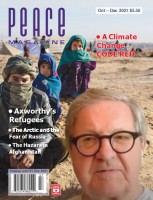
Peace Magazine October-December 2021, page 5. Some rights reserved.
Peace Magazine (July/September issue, 2021) did well to publish William Fletcher and Craig Smith’s review of Bill Gates’s book, How to Avoid a Climate Disaster. The reviewers’ many positive comments may lead many people to face the daunting struggle to address climate change. It needs to be pointed out, however, that Gates deals with less than a third of the problems facing humanity, since he pays attention only to the technical aspects of a solution, and as such is in good company with notables such as Cambridge University’s Sir David King.
The problem is deeper. We have not only to halt climate change, but to reach a sustainable form of living. This double challenge requires a major change of mentality, whereby the health of the entire ecosphere becomes a central objective in people’s minds. This idea is completely absent from Gates’s book. Neither ecological footprint nor biocapacity are mentioned, yet the world’s ecological footprint has exceeded its biocapacity since 1970 and the ratio of footprint to biocapacity continues to increase annually! The United States and United Kingdom each have footprints that exceed their biocapacities by about 170 percent!
Also omitted is any mention of increasing natural wealth, an essential investment for increasing biocapacity. Nor is there any mention of Jem Bendell’s call for “deep adaptation,” which I will now attempt to explain. The human race has left it so late to deal with the elimination of greenhouse gas emissions, that it is very unlikely there will be enough green energy by 2050 to supply everyone with what, today, they see as their needs. Should there be such a shortage of green energy, as is predicted by major energy agencies, then the human race must face up to living with that shortage for a time, while the excess CO2 in the atmosphere is being sequestered and further green energy supplies are being developed. Bendell is not alone in crying for deep adaptation.
Lastly, Gates omits mention of population. While many optimists believe that the world can feed 10 billion people at some estimated future date, it is easy to forget that there have been famines in recent years, and each year’s growing population makes famines more likely. Furthermore, each additional 100 million mouths to feed (roughly the annual population increase) makes getting to zero emissions harder. And we shouldn’t forget that the growing human population is crowding out most of the wild animals and reducing the numbers of most species at an alarming rate.
To summarise, the change of mindset, mustering the will to begin natural wealth creation, deep adaptation, and achieving a deliberate, slow population reduction are all more difficult than the technical problems of providing green energy.
Derek Paul, Montréal
Again, the Association of World Citizens (AWC) appeals to the parties in the armed conflict in Ethiopia for negotiations to end the fighting and deal with its consequences — especially the hunger. Mark Lowcock, the United Nations (UN) Undersecretary-General for Humanitarian Affairs, has warned that nearly five million of the six million population of the Tigray Province needed food assistance and the number grows as fighting spreads to other regions.
Shortly after fighting began last November, AWC had made a first appeal for negotiations in good faith. Journalists and most NGOs were then prevented from going to Tigray. However, by February, enough information had been gathered from refugees for Amnesty International to present a first report on the extent of human rights violations, with multiple corroborated reports of widespread atrocities involving mass killings, rapes, and the abduction of civilians.
Each day, Ethiopian Defense Forces, Eritrean Defense Forces and ethnic militias face Tigrayan forces. There is a buildup of Sudanese government forces on the Ethiopia-Sudan border and the whole Horn of Africa is in danger of greater destabilization. The Ethiopian central government has refused mediation by the UN or the African Union. It is not clear who is in a position to negotiate for Tigray, were negotiations to be undertaken.
René Wadlow, Gravières, France